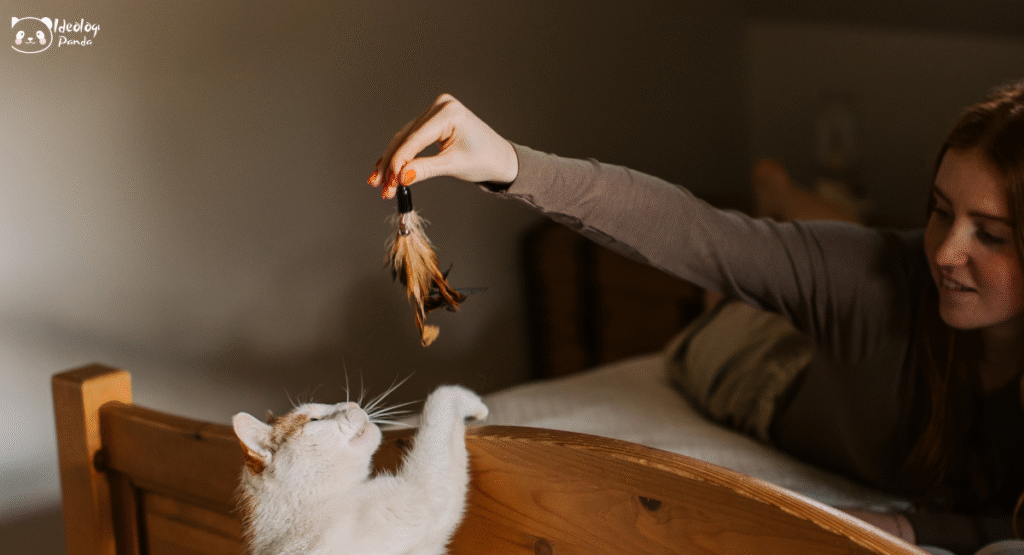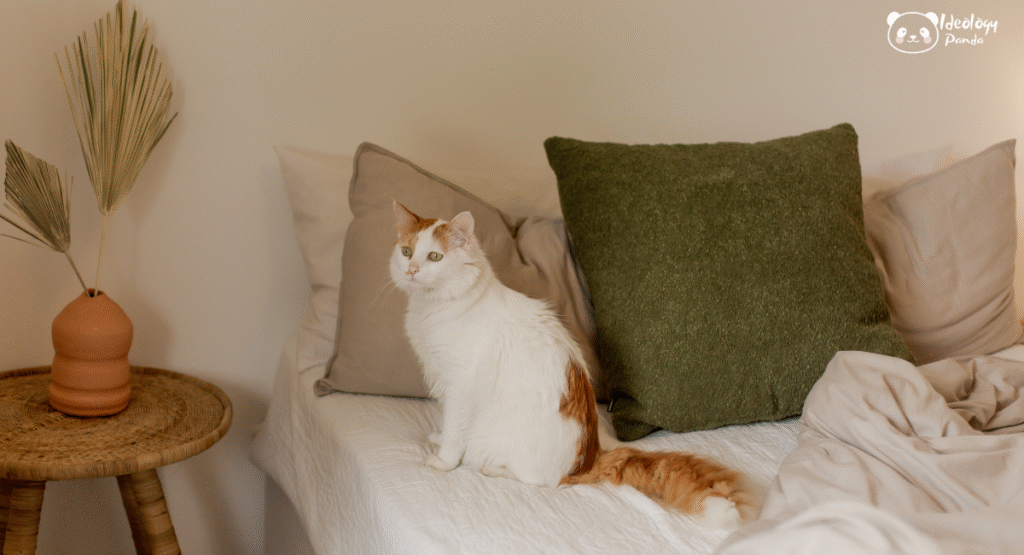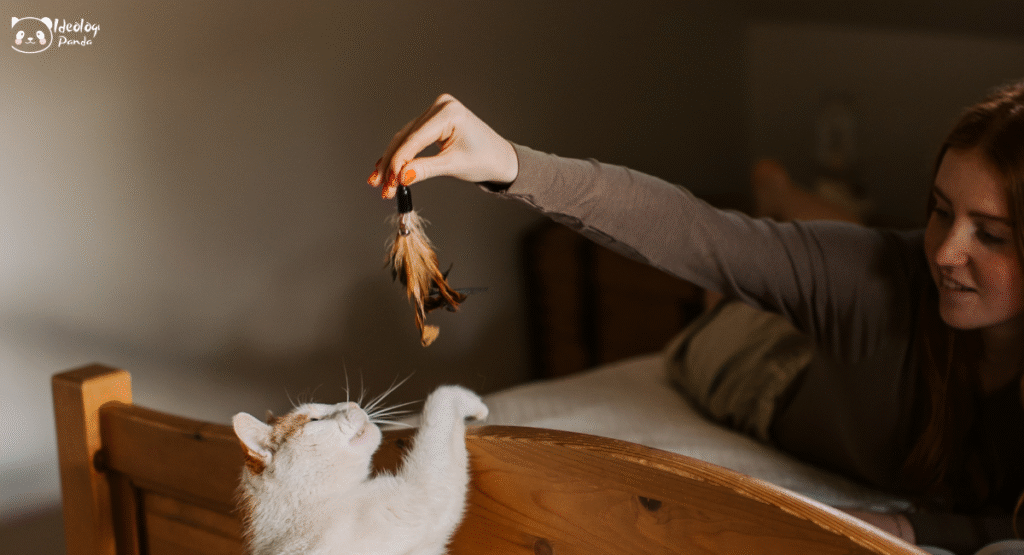There’s nothing quite like the cozy comfort of curling up in bed with your purring feline friend after a long day. However, if you’re greeted by an unwelcome discovery on your sheets, your cat’s unexpected ‘gift’ can leave you bewildered and searching for answers, wondering, “Why Is My Cat Pooping on My Bed?” Cat pooping on bed is a behaviour that often surprises owners because cats are usually so meticulous about their litter habits. Why would they choose your bed as a bathroom? Before you worry that your beloved pet is out to spite you, let’s explore some of the common and solvable reasons behind this distressing behaviour. This guide will provide you with the understanding and tools you need to help keep your bed clean and your cat happy.
Finding cat poop on your bed is not only unpleasant but also deeply confusing. Cats are known for their cleanliness, so why is your cat pooping on your bed all of a sudden? This behaviour, though distressing, often has underlying causes that you can address with practical solutions.
In this detailed guide, we will explore why your cat is pooping on your bed, what medical or behavioural issues could be involved, and actionable steps to stop this behaviour permanently.
Litter Box Problems Leading to Cat Pooping on Bed
Once health issues are ruled out, you need to examine the litter box situation. Cat pooping on bed can often be linked to litter box problems. Cats are very particular about their litter habits, and any problem with the box can result in them pooping elsewhere, including your bed. A common reason is a dirty litter box. Cats dislike stepping into soiled litter, and if the box is not scooped daily, they may seek alternative places like your bed.
Another factor is the litter type. Some cats dislike scented litters, pellets, or crystals, preferring unscented, fine clumping litter that feels comfortable under their paws. The box size also matters. If it is too small for your cat to turn comfortably, they may avoid it. Covered litter boxes can trap odours and make some cats feel trapped, leading them to poop outside. Additionally, the box’s location plays a role. If it is placed in a noisy, high-traffic area or too far from their main living space, they may not feel safe or comfortable using it, resulting in cat pooping on bed incidents.
Make your litter box as appealing as possible:
- Clean it daily
- Have one box per cat, plus one extra
- Try different litters to find your cat’s preference
- Ensure easy access – avoid basements or rooms with closed doors
- Remove covers if your cat dislikes enclosed boxes
Territory Marking: Another Reason for Cat Pooping on Bed
Another possible reason is territorial behaviour. Although urine marking is more common, some cats defecate in specific areas to claim territory, especially if they feel threatened by other cats in the house or see outdoor cats through the window. Your bed, being a prime spot with your scent, becomes their chosen place to assert territorial control. This is more likely in multi-cat households where hierarchy disputes occur or if your cat feels their territory is being invaded.

Behavioural Changes to Prevent Cat Pooping on Bed
If you are asking yourself “Why Is My Cat Pooping on My Bed?”behavioral modifications are equally important to resolve this issue effectively.
Cat pooping on bed is often linked to anxiety, stress, or territorial insecurity. Temporarily restrict your cat’s access to the bedroom while you work on solutions. You can use pheromone diffusers like Feliway to create a calming environment, especially if the cause is stress or anxiety. Increase interactive playtime with your cat using toys like feather wands or laser pointers to build confidence and release pent-up energy. Feeding your cat at consistent times and maintaining a stable daily routine helps them feel secure and reduces stress-related elimination problems.
If your cat is pooping on your bed due to anxiety when you are away, consider leaving out worn T-shirts with your scent around their safe areas or using calming treats before departure. In multi-cat households, ensure each cat has their own litter box, bed, food and water bowls to minimise competition and stress. Provide vertical spaces like cat trees or window perches to give each cat their own territory within your home, which will reduce territorial anxiety and help stop cat pooping on bed behaviour effectively.
Cleaning and Deterrents to Stop Cat Pooping on Bed
If you’re wondering “Why Is My Cat Pooping on My Bed?”, one of the important steps to resolve this issue is thorough cleaning and using effective deterrents. It is vital to clean soiled bedding thoroughly using enzyme-based cleaners that fully break down the odour molecules. Cats have a much stronger sense of smell than humans, and if even a trace of their scent remains, they are likely to return to the same spot. Avoid using ammonia-based cleaning products as they mimic the scent of urine and may encourage repeat accidents. You can also use temporary deterrents such as citrus sprays or aluminium foil on the bed when unsupervised, as cats dislike their texture and smell. Addressing cleanliness properly is a key part of stopping your cat from pooping on the bed repeatedly.
Avoid Punishing Your Cat for Pooping on Bed
If you are wondering “Why Is My Cat Pooping on My Bed?”, remember that cat pooping on bed is not a behaviour to punish. Punishing your cat for pooping on the bed will only create fear and worsen the behaviour. Instead of scolding, focus on understanding the root cause behind this sudden change and making the necessary adjustments to your cat’s environment, health care, and emotional wellbeing. In some cases, especially where severe anxiety or behavioural disorders are involved, consulting a feline behaviourist or your veterinarian for professional advice may be necessary to resolve the issue effectively.
Final Thoughts
Seeing your cat pooping on bed is undoubtedly stressful, and it often leads you to question “Why Is My Cat Pooping on My Bed?”. However, remember that this behaviour is not done out of revenge or spite. Cats do not think in those terms. They are communicating a need or discomfort that requires your attention. By being patient, compassionate, and proactive in addressing their health, litter box hygiene, environment, and emotional needs, you can resolve this problem effectively. Once your cat feels secure, healthy, and comfortable with their litter box setup, this distressing
behaviour will likely stop, and your home will return to being the clean, peaceful space you both deserve.
behaviour will likely stop, and your home will return to being the clean, peaceful space you both deserve.




